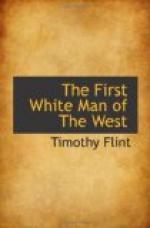Nature had moulded him of a form and temperament to look the formidable red man in the face. He was six feet, muscular, broad chested, of a firm and animated countenance, keen and piercing eyes, and sparing of speech. He gained himself an imperishable name in the annals of Kentucky, under the extreme disadvantage of not knowing how to read or write! Obliging and benevolent to his neighbors, he was brave and active in their defence. A successful, because a persevering and intelligent hunter, he was liberal to profuseness in the distribution of the spoils. Vigilant and unerring with his rifle, it was at one time directed against the abundant game for the sake of his friends rather than himself; and at others, against the enemies of his country. Guided by the inexplicable instinct of forest skill, he could conduct the wanderer in the woods from point to point through the wilderness, as the needle guides the mariner upon the ocean. So endowed, others equally illiterate, and less gifted, naturally, and from instinct, arranged themselves under his banner, and fearlessly followed such a leader.
If it was reported, that a family, recently arrived in the country, and not yet acquainted with the backwood’s modes of supply, was in want of food, Harrod was seen at the cabin door, offering the body of a deer or buffalo, which he had just killed. The commencing farmer, who had lost his oxen, or plough horse, in the range, and unused to the vocation of hunting them, or fearful of the Indian rifle, felt no hesitancy, from his known character, in applying to Harrod. He would disappear in the woods, and in the exercise of his own wonderful tact, the lost beast was soon seen driving to the door.
But the precincts of a station, or the field of a farm, were too uncongenial a range for such a spirit as his. To breathe the fresh forest air—to range deserts where man was not to be seen—to pursue the wild deer and buffalo—to trap the bear and the wolf, or beside the still pond, or the unexplored stream, to catch otters and beavers—to bring down the wild turkey from the summit of the highest trees; such were the congenial pursuits in which he delighted.
But, in a higher sphere, and in the service of his country, he united the instinctive tact and dexterity of a huntsman with the bravery of a soldier. No labor was too severe for his hardihood; no enterprise too daring and forlorn for his adventure; no course too intricate and complicated for his judgment, so far as native talent could guide it. As a Colonel of the militia, he conducted expeditions against the Indians with uncommon success. After the country had become populous, and he a husband and a father, in the midst of an affectionate family, possessed of every comfort—such was the effect of temperament, operating upon habit, that he became often silent and thoughtful in the midst of the social circle, and was seen in that frame to wander away into remote forests, and to bury himself amidst the unpeopled knobs, where, in a few weeks, he would reacquire his cheerfulness. In one of these excursions he disappeared, and was seen no more, leaving no trace to determine whether he died a natural death, was slain by wild beasts, or the tomahawk of the savage.




